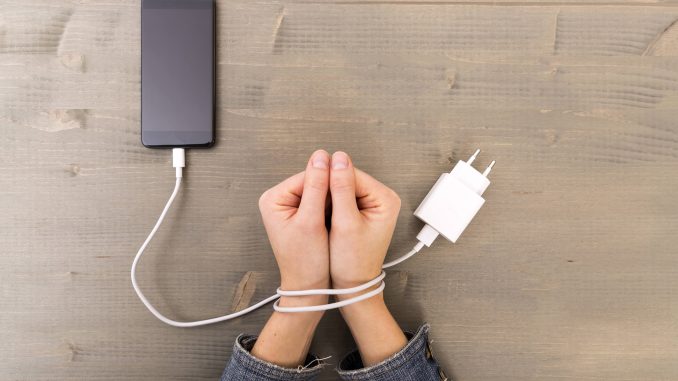
By Ian Ezinga
You may find yourself living in a shotgun shack, or in another part of the world, or behind the wheel of a large automobile, or in a beautiful house with a beautiful wife, and you may ask yourself, “how did I get here?” This sped up allegory for waking up to a reality governed by passivity and complacency ties together a couple of random situations by asking one question.
The question is as common to mankind as asking what time it is. However common it may be, for one reason or another, it often takes a break from dominating the collective consciousness belonging to whatever present you’re reading this in.
My understanding of history, sponsored in part by four years of undergraduate studies, has centralized this question in my grappling with nearly any subject. Pertinent among my concerns, thanks in part to a class I’m taking and my own struggles, is the increasing amount of time we sacrifice daily to our phones.
You may find yourself asking why I would even bother to write about this. It’s pretty obvious, isn’t it? We are all on our phones too much, just read a book and move on. Funnily enough, my hardly unique interest in our species’ worship of the phone took on a new disposition as I read an assigned book about the development of American cultural understanding of the urban landscape during the 19th century.
I’m aware that this might not sound particularly riveting, but buried in a chapter examining how industrialism changed workers’ perception of the workplace, not to mention their entire lives, I found an especially resonating passage.
The newly arriving machines and factories were quickly understood by contemporary cultural critics as being complicit in the act of reducing workers’ humanity. Unlike craftsmen and tradespeople of previous millennia, the tools were no longer in complete control of humans. Instead, people were becoming subject to the demands of the machine, at least in the workplace.
Critics, such as Alexis de Tocqueville, warned that this sensation, when repeated over the course of a worker’s life, could dull their senses and critical thinking skills since these wouldn’t be needed for an activity that took up more than half of their waking hours.
This would inevitably result in a major threat to democracy. The danger would lie in the further stratification between an upper class, whose ample resources and free time would allow them to exert a hefty influence on the nation’s governance, and working people, who would be condemned to the dulling of their senses throughout a workday.
The resonance of this passage for me lies in how for most Americans today, not only do we work jobs that don’t require much more than our bodies, but even when we are off the clock, we are equally susceptible to forces that, by design, inspire our minds to detach, unplug, and consider little outside the purview of our screens.
The same significance spoken to truth by cultural critics of the mid-19th century is one found in our own lifetime, but to a much stronger degree. Tech companies eke out a parasitic living in today’s world by kidnapping our attention and holding it ransom until we go through all possible content in our feeds, buy something, or fall asleep.
In the recently leaked documents from a former Facebook employee, it was revealed that the company was well aware that the average American’s screen time had surged to over six hours a day during the pandemic. The documents reveal what would have been easy to guess: companies like Facebook don’t want to give up a minute of that time.
Both the industrialists from centuries past and the tech companies of today profit from our mindless engagement with their machines. A brief aside delivers an interesting note that humans have now found a way to exploit others by both maximizing their productivity and dissuading it altogether.
But whatever yield companies like Facebook enjoy for their efforts in capturing and mutilating our imaginations is a small sum compared to the dividends paid to the political machine humming at the helm of the country. Whether regarding Congress or the president, Democrat or Republican, all sick-in-the-head parties involved are really happy to see how much time you spent nodding off on your dopamine IV drip.
Taking this all into account, I reckon that reading a book isn’t the worst suggestion to the screen time problem. But in order to even get that far, we need to begin to think a lot more critically about the benefits of being on our phones compared to some of its hazards. I suppose, then, my opinion is that the next time you clock out of a thirty-minute doom scroll, ask yourself, “how did I get here?”
